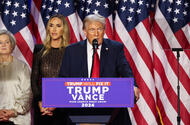President elect Donald Trump makes a speech during election night (Photo: Anadolu/Getty Images)
President elect Trump railed against Europe and particularly its car exports during his election campaign
Car makers exporting to the US are waiting to see whether Donald Trump will convert his rhetoric on import tariffs into reality as they digest the news that the Republican has won a second term as president.
The US is a key market for premium and luxury UK car makers, with models from JLR, Bentley, Aston Martin, McLaren and Rolls-Royce comprising the bulk of the 73,571 UK car exports to the US last year.
JLR in particular is vulnerable to any potential tariff hike on European cars, given the US was the company’s biggest global market in the first nine months of the year, taking three out of every 10 cars the company sold. JLR said it wouldn’t comment on the issue.
Trump has railed against Europe and particularly its car exports in the run up to Tuesday’s election. “They don’t take our cars. They don’t take our farm products. They sell millions and millions of cars in the United States. No, no, no, they are going to have to pay a big price,” Trump told meeting of the Economic Club of Chicago in October. “To me, the most beautiful word in the dictionary is ‘tariff’.”
Car makers like BMW, who have a manufacturing base in the US, are better placed. “If you are a local producer with a local footprint, you are of course benefiting in case there’s something changing on the tariff side,” BMW CEO Oliver Zipse told analysts on the company’s earnings call today (Wednesday).
BMW builds SUVs including the X3 and X6 at its giant Spartanburg plant in South Carolina, satisfying 65% of its demand in the US, Zipse said. “That’s a kind of a natural protection,” he said.
However, ZIpse also cautioned against reading too much into pre-election promises. “Let’s not speculate whether there will be tariffs. It might also be that this is a verbal issue only,” he said.
Premium rivals Mercedes-Benz and Volvo also build cars in US plants, but Audi along with many volume brands are more exposed to a potential tariff-happy Trump presidency because of their manufacturing concerns in Mexico.
Mexico has become a key low-cost manufacturing location for US sales in a recent years, but the practice has come under attack from populist Republican firebrands for what they see as the theft of traditional US jobs. “All I’m doing is saying: ‘I’ll put 200[%] or 500[%], I don’t care.’ I’ll put a number where they can’t sell one car,” Trump told Fox News during an interview in October.
Honda warned that its operations in the US could be affected as a result. “The impact could be 160,000 units subject to a tariff. That is a big impact,” executive vice president Shinji Aoyama told analysts on the company’s earnings call today (Wednesday).
Trump is also expected to roll back incentives for electric vehicles, which currently attract up to $7500 tax incentives as part of the huge Inflation Reduction Act (IRA) programme designed to put the US on the global map for EV production.
Trump has made little secret of his disdain for EVs and could seek to water down the IRA, including its generous payout to battery manufacturers building plants in the US.
Complicating the issue is Trump’s unlikely relationship with Tesla CEO Elon Musk, who has done little to push back on Trump’s attacks on EVs but is expected to seek advantages to his company, particularly when it comes to softening regulatory burdens on deploying autonomous cars.
Trump’s win caused a 3.5% rise in the value of Tesla stock on Wednesday.
The IRA is also likely to be protected by the reaction from affected states should Trump attempt to yank any promised manufacturing incentives.
“There’ll be a lot of Republican governors that will take their jet up to Washington and scream at somebody. So I just don’t think that that’s actually going to happen,” Michael Robinet, executive director of automotive advisory services for S&P Global Mobility, said at the Automotive News Congress in September.
Trump’s win comes at a difficult time for the global automotive industry, which has thrived in recent years on relatively free global trade but is now having to face the fallout of increased protectionism, so far mainly focused on Chinese exports. The US has already put a 100% tariff on Chinese EVs. The European Union has also voted to impose tariffs, threatening a backlash in China, where many European brands including the Volkswagen Group, Mercedes, BMW and JLR, have made strong profits in recent years.







